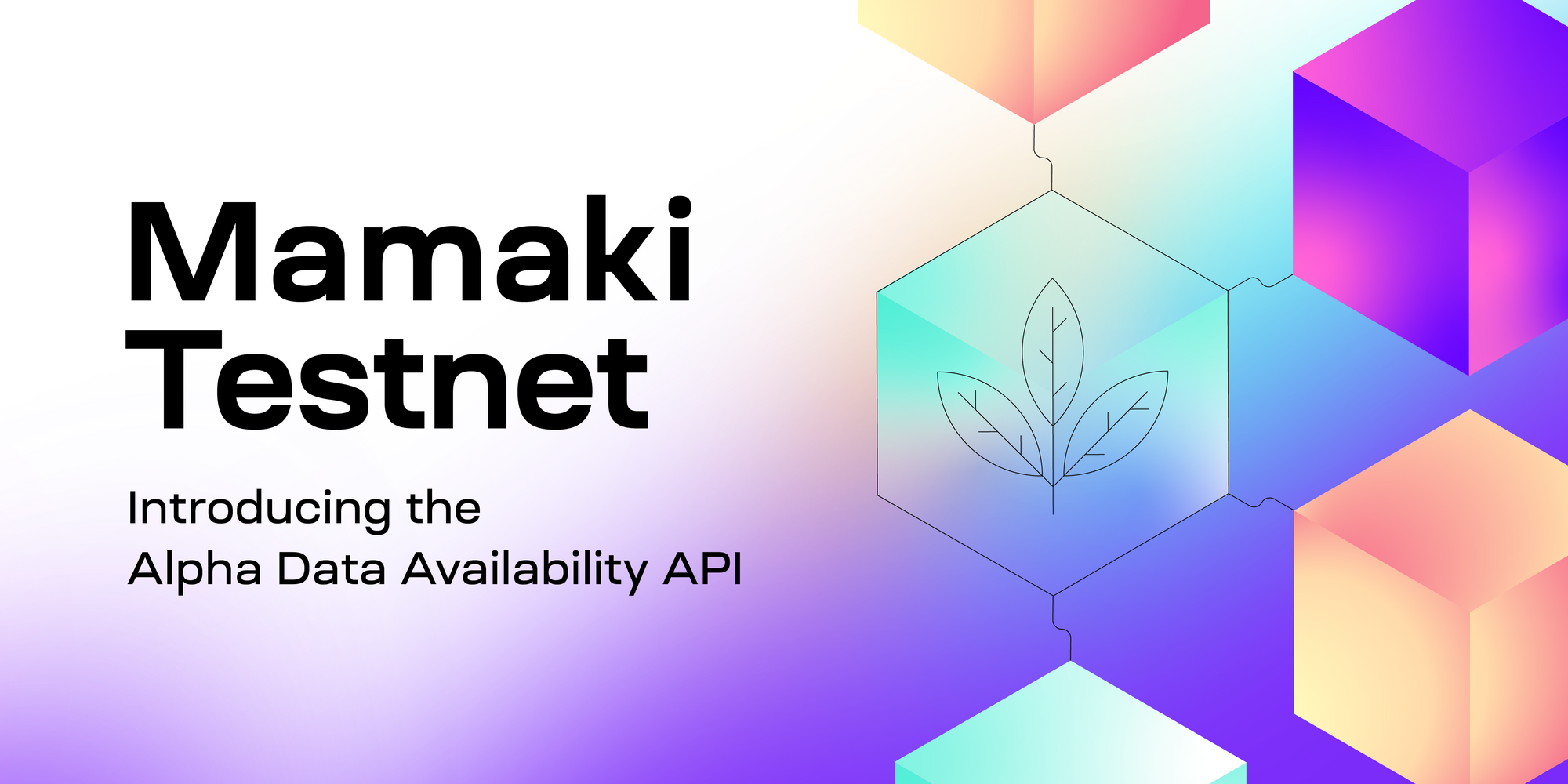Celestia Testnet Introduces Alpha Data Availability API

Today, we are excited to announce the launch of the new Celestia “Mamaki” testnet!
This marks the next step in our road towards Celestia mainnet - a modular blockchain network that decouples consensus from execution. We are one step closer to enabling anyone to easily deploy their own blockchain, without the overhead of bootstrapping a new consensus network.
The Celestia testnet, codenamed Mamaki, will serve as an upgraded version of the now-retired devnet, featuring many new enhancements and bug fixes. Please note that Mamaki is not Celestia’s incentivized testnet, which is planned closer to mainnet.
Celestia’s Data Availability API
Mamaki introduces a new data availability API. It’s a simple but effective API that unlocks a powerful primitive for building blockchains: ordered and available data. The data availability API’s core function enables developers to submit data for a namespace and retrieve data by namespace from Celestia.
For now, Mamaki is releasing only the alpha version of the API, as we anticipate the technology to evolve. We welcome feedback from developers and users to make improvements for further iterations of both the API and general testnet features.
New features
Here’s a list of the new features that are available:
- Node RPC and alpha data availability API: RPC and API endpoints allow developers to submit and retrieve data by namespace ID.
- Initial implementation of peer-to-peer block reconstruction: Full nodes can reconstruct blocks from chunks sampled by light nodes. More testing and efficiency improvements are to be made, but this marks an important milestone.
- Bad encoding proofs (rollout pending): Full nodes will be able to share bad encoding proofs for alerting light nodes to incorrectly erasure coded blocks (P2P component merge pending).
- Historical data availability sampling: Nodes can conduct data availability sampling over historical block headers in addition to new block headers.
- Optimint: Our ABCI client implementation for building rollups using the Cosmos SDK can now read and write data to Celestia’s DA layer.
- Fee market: Fees are now charged based on the size of data that is submitted in PayForData transactions.

Mamaki for developers
With the new features we’ve added to the testnet, developers will have an improved environment to build and experiment. Here’s what developers can interact with now:
- Node RPC and alpha data availability API: Developers can submit PayForData transactions to an instance of celestia-node and retrieve data shares by namespace ID for a given block height.
- Build Cosmos SDK rollups: Developers can create rollups with the Cosmos SDK using Optimint as the ABCI client. Initially, Optimint is limited to a centralized sequencer and no fraud proofs.
Other projects developed in parallel with the Celestia chain will provide additional features to Mamaki. This will enable more use-cases and experimentation for developers. These future upgrades will include:
- Example EVM settlement layer: Developers can deploy rollups that require an EVM environment for settlement onto a Celestia-native EVM settlement layer.
- Quantum Gravity Bridge: Developers can use Celestia as a secure source of off-chain data availability guarantees for their sidechains and validiums, while still using Ethereum for settlement.
We look forward to hearing your feedback on these new features on Discord and GitHub. Alongside these future upgrades, general bug fixes and stability improvements are also expected.
Mamaki for community members
Community members can participate in Mamaki in the following ways:
- Operate nodes: All participants can run a light node that conducts data availability sampling or a full storage node. If you are an experienced PoS validator that can attract enough delegations to make it into the active set, you can also run a validator. Note, the active validator set is capped at 150.
- Receive testnet tokens from the faucet: Testnet tokens can be received from the faucet on Discord to test features of the network.
- Delegate to and undelegate from validators: Testnet tokens can be used to delegate to and undelegate from validators.
- Send transactions between wallets: Users can add Celestia as a network to Keplr and transfer tokens between Celestia addresses. Testnet tokens can also be transferred using the command line.
Please note that Mamaki is not Celestia’s incentivized testnet, which is planned closer to mainnet.
How to get started
For developers that want to start interacting with the testnet, check out the documentation. If you have any questions, you can join the Discord and head to the #testnet channel. Be sure to follow our Twitter for updates.
Celestia will host a community call on June 8, 2022 to discuss the latest details around Mamaki.
Build modular. Be free.
Celestia envisions a world of sovereign communities. Our core belief is that groups of people with shared goals have an inalienable right to self-organize, unburdened by the status quo. Blockchains are social coordination tools and modular blockchains empower communities to coordinate with greater freedom and flexibility.


